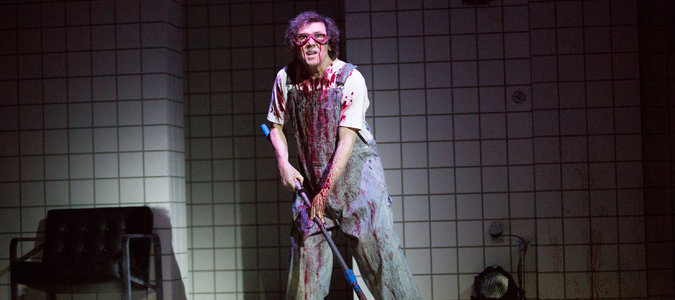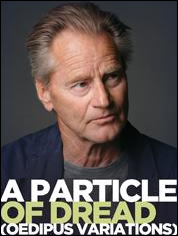

A Particle of Dread
Opening Night: November 23, 2014
Closing: January 4, 2015
Theater: Signature Theatre
Signature and Ireland’s renowned Field Day Theatre Company are thrilled to present the U.S. premiere of 1996-97 Playwright-in-Residence Sam Shepard’s A Particle of Dread (Oedipus Variations). This dark, fragmented, modern-day take on Oedipus Rex premiered in Derry, Ireland, and features a cast of actors from both sides of the Atlantic.
BUY TICKETSREAD THE REVIEWS:
November 23, 2014
When it comes to change, homo sapiens is frequently the species in which it’s seen last — if ever. Stories of jealousy, rage, commitment gone awry, and family implosions are foremost among those that have survived the last several millennia, long after creations of more current import have figuratively and literally turned to dust. Sam Shepard, a playwright whose works frequently explore the idea that the best way to understand the present is to examine the past, dives back about as far as one can go — 2,500 years — for his play A Particle of Dread (Oedipus Variations), which just opened at the Pershing Square Signature Center. Sure, the places, faces, and names might shift around a bit, but ultimately we keep making the same mistakes over and over again. If Shepard tells that story well enough here, he does not tell it subtly, twisting up the Oedipus narrative we know with a present-day rethink that doesn’t echo the original so much as copy it, except in a few details of interpretation. The Oedipus of then is the Otto of now (both are played by Stephen Rea), who only slowly discovers that wife Jocasta/Jocelyn (Brid Brennan) is not who he thought and that the disappearance of her first husband, Laius/Lawrence (Aidan Redmond), has more terrifying implications for all of them than he ever could have imagined.
READ THE REVIEWNovember 24, 2014
At least a passing knowledge of Sophocles’ Oedipus Rex should be required before seeing Sam Shepard’s A Particle of Dread (Oedipus Variations) at the Pershing Square Signature Center. If you don’t know this ancient yarn, the new 85-minute drama, featuring a mixed company of Irish and American actors, will leave you pretty confused. Then again, if you are familiar with that Greek tragedy, chances are you’ll be a bit puzzled by this alternately brilliant and mindboggling take, which is directed by frequent Shepard collaborator Nancy Meckler. “Variations” is the imperative word here. Like jazz music, Shepard starts with a theme — in this case, the tale of the man who kills his father, inadvertently marries his mother, and gouges out his eyes in despair — and then riffs on it for a while. There are a series of interconnected plots, put together in the jagged-edged fashion of someone trying to reassemble a glass vase that fell off a shelf and shattered into a million little shards. A police officer and a forensic investigator (Jason Kolotouros and Matthew Rauch) attempt to solve a crime scene involving three dead bodies on the side of the road, some tire tracks, and a lopsided pair of footprints. An elderly paraplegic (Stephen Rea) tries to put this story together himself, to the chagrin of his wife (Brid Brennan), and grown daughter (Judith Roddy), who has significant problems of her own. And then there’s Oedipus himself (Rea again), whose storyline follows the Sophocles pretty faithfully.
READ THE REVIEWNovember 23, 2014
It might be wise to reread Oedipus the King before seeing A Particle of Dread (Oedipus Variations), now receiving its American premiere courtesy of the Signature Theatre. Sam Shepard’s aptly titled theatrical meditation on Sophocles’ Greek tragedy is like a series of jazzy riffs on its inspiration, plumbing the existential emotions of the work while loosely adapting it to modern-day times. This oblique intellectual exercise is likely to prove off-putting to all but the most adventurous audiences, although Shepard completists will no doubt want to catch the latest offering from the playwright’s ever-restless imagination. Originally presented by Ireland’s Field Day theater company, the piece stars veteran Shepard interpreter Stephen Rea in the dual roles of Oedipus and Otto. That duality is a recurring theme of the work, which alternates between a barely conveyed ancient Greece and the Southern California desert near Barstow. Oedipus, you’ll remember, was cursed by the prophecy of the Oracle of Delphi, here known as “Uncle Del” (Lloyd Hutchinson), with the fate of eventually murdering his father, Laius, and marrying his mother Jocasta. To prevent these horrific events from happening, Laius penetrated his infant’s feet with a large pin and left him to die. The child was rescued and allowed to grow into manhood and, well, you know what happened next.
READ THE REVIEWNovember 23, 2014
It’s hard to know what’s going on during Sam Shepard’s new play — but A Particle of Dread (Oedipus Variations) always holds your interest. Having the great Irish star Stephen Rea (The Crying Game, TV’s The Honorable Woman) is a bonus, but the style is pure Shepard, a writer who’s laid bare the damaged soul of American families. As the subtitle indicates, Shepard went back to the original twisted clan, taking on the Greek myth about a man who mistakenly kills his own father and unwittingly marries his own mother. Except the story is now a noir thriller with touches of Grand Guignol gore and a sprinkling of surreal humor. The tone is obvious as soon as we discover Frank Conway’s set, a white-tiled slaughterhouse or torture chamber, with blood-soaked rags and intestines hanging from a clothes line in the corner. Under Nancy Meckler’s efficient direction, the action moves back and forth between ancient Greece and contemporary California, the site of a ghoulish triple murder by a highway.
READ THE REVIEWNovember 23, 2014
Though there’s no discounting the exponential possibilities of television spinoffs, it seems unlikely that a series called “CSI: Ancient Thebes” will be appearing on your screens anytime soon. If you feel this leaves a yawning vacuum in your crime-show-addicted life, you might want to take a look at A Particle of Dread (Oedipus Variations), the new play by Sam Shepard that opened on Sunday night at the Pershing Square Signature Center. Yes, you read that right. Mr. Shepard, that most enduring of American avant-garde playwrights, has sent a forensic scientist — in a trench coat, no less — into the realm of classical mythology to investigate the mysterious murder of a king at a crossroads. His conclusion: The killer was a lone assassin with a big left foot and a whole lot of rage. Not a huge surprise, huh? This is one case in which everybody has known whodunit for a few thousand years. The murder of the Theban king Laius by the son he once left for dead has inspired, among other things, a Greek tragedy (which is considered the archetypal detective story) and a psychological category for defining mama’s boys. Now, Mr. Shepard — whose work has always had a mythic cast, as well as plenty of pity and terror for the human condition — is plowing those fields seeded by Sophocles and Freud. Using a centuries-spanning arsenal of devices to consider the case — from soothsayer-readable entrails to DNA analysis — he doesn’t dig up much in the way of new insights on the once-mighty, sadly fallen, forever-damned Oedipus Rex.
READ THE REVIEW























